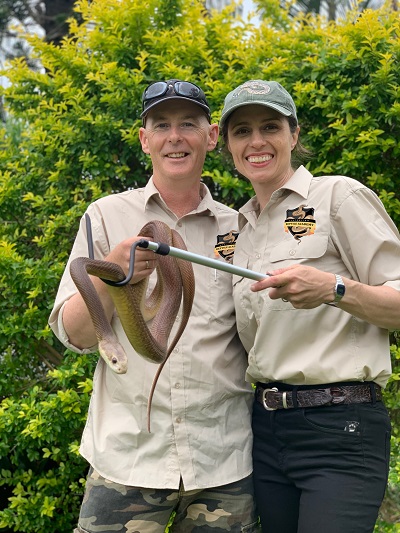
University of Queensland snake and venom researcher Dr Christina Zdenek is working hard to keep Australians (and snakes) safe, as part of a new awareness campaign being run by the country’s largest biotechnology firm.
National Venomous Bites and Stings Day was launched on 19 November by CSL Seqirus, partnering with Dr Zdenek, and her husband Chris Hay’s snake-handling-training company the Australian Reptile Academy, to help raise awareness about the risks of venomous animals.
“In Australia, we have highly venomous wildlife, so first-aid awareness can absolutely make the difference between life and death for these medical emergencies,” Dr Zdenek said.
“So being in Australia – and being Australian – is, in part, about learning to live in the Australian environment, with our amazing biodiversity, which includes plenty of highly venomous critters.
“I primarily work with venomous snakes, and snakes are incredibly important for the health of our ecosystems because they serve as predators and prey for good ecosystem function and nutrient circulation.
“And they’re vital in keeping vermin populations down, including rats, as well as the ticks and fleas that live on those vermin, which otherwise may harm our pets.
“So, it’s critical we learn to live with these important animals.
“In practice, you can do this by improving your species-identification skills, for example, being able to tell a python from a non-python.
“Or being prepared with a snakebite bandage on hand and first-aid knowledge, and keeping your distance in the unlikely event you do encounter a snake.”
Dr Zdenek said that, when it comes to venomous bites and stings, prevention is better than cure, so avoiding a bite is the best option.
“Never try to catch a snake unless you’re a trained professional needing to do so, and never try killing a snake – that’s asking for a bite – and it’s also illegal and barbaric.
“But accidents do happen, and that’s why it’s so important for anyone on Australian soil – citizens, residents, and visitors – to know what to do in case of a venomous bite or sting,” she said.
“If you’re bitten by a snake, for example, you should generally keep at rest, dial 000, do not wash venom off, apply a stretchy-compression bandage up the whole limb, immobilise the limb to prevent muscle movement, and begin CPR if necessary at any stage.
“But the best place for bite- and sting-specific information is the excellent Australian Bites and Stings mobile app, or the Australian Bites and Stings website, which I highly recommend for up-to-date information and expert guidance.”
Dr Zdenek’s research also spans venom variation, bio-discovery, and snake behaviour, helping reduce the human-snake conflict around the world.
“My work helps map the geographic and species patterns of venom variation, which has helped identify gaps in international conventional treatments,” Dr Zdenek said.
“This pre-clinical work – mostly in vitro on human plasma – helps fill knowledge gaps especially for snake species where treatment for snakebite is currently unavailable or not easily accessible.
“My work also aids in assessing the effectiveness of next-generation snakebite therapeutic options and with colleagues, I’ve also developed a new, innovative method to study snake venom neurotoxicity, without the use of animal models.
“This attribute of this method enables versatility and flexibility that has historically been impossible and has significant biomedical implications.
“My life’s mission is for people to appreciate venomous wildlife and learn to live with them, rather than persecute them.
“It’s certainly possible – people just have to open their minds and let science inform their attitude and behaviour.”
Media: Dr Christina Zdenek, c.zdenek@uq.edu.au, +61 475 267 909; Faculty of Science Media, science.media@uq.edu.au, +61 (0)438 162 687.



